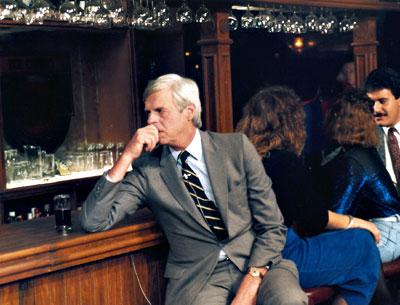George Plimpton: His Own Best Subject

“Plimpton! Starring George Plimpton as Himself,” which will have its nationwide broadcast premiere tomorrow at 9 p.m. on PBS and locally on WNET, is a spellbinding film that chronicles the life of a singular man. George Plimpton grew up in a duplex apartment on upper Fifth Avenue, attended St. Bernard’s School, Phillips Exeter Academy, Harvard -— where he was a classmate and close friend of Robert F. Kennedy — and Cambridge University. But even if you know nothing about his background, you have only to hear him speak to know he was a patrician. And one of the many pleasures of “Plimpton!” is that you get to hear him speak a great deal.
But before Cambridge, before Harvard, there was Exeter, and we learn from Plimpton’s brother Oakes that the Plimpton family “was Exeter” and that George was kicked out of the prestigious private school. Plimpton’s son Taylor then reads “How Failing at Exeter Made a Success out of George Plimpton,” an essay his father wrote for the Phillips Exeter Academy Bulletin in 2002.
In Plimpton’s own words, “I bring you greetings from the Daytona Beach High School,” from which he received his diploma before setting off for Harvard, which had already accepted him. “Thus I come to you as sort of an outsider, as if you were being addressed by Satan, once an archangel, but then tossed out of Heaven.”
A recurring theme of the film is how Plimpton managed to be both a part of the privileged milieu into which he was born, and apart from it as well. His father was a prominent attorney and a founding partner of the white-shoe firm Debevoise and Plimpton. But George was reading English at Cambridge in 1953 when he received a phone call from Peter Matthiessen, who was starting a magazine in Paris and wanted Plimpton to edit it.
Rather than list the writers published in The Paris Review over the next 60 years, suffice it to say that every writer of note was interviewed or otherwise published in the magazine — except for Plimpton.
Where Plimpton was published was in Sports Illustrated, which arranged for him to pitch in 1958 in a postseason all-star baseball game with a roster including Willie Mays and Mickey Mantle. The result was “Out of My League,” published in 1961 and the first of Plimpton’s forays into participatory journalism.
He subsequently played basketball with the Boston Celtics, boxed with Archie Moore, played the triangle and gong with the New York Philharmonic, performed as a stand-up comedian in Las Vegas, played hockey with the Boston Bruins, and photographed wildlife in Africa, to name just a few of his endeavors. But it was “Paper Lion,” the story of his stint as a Detroit Lions quarterback, that made The New York Times’s best-seller list and him a celebrity.
Plimpton had a house in Sagaponack and was part of what Vanity Fair magazine called “the Sagg Main set,” which also included Truman Capote, James Jones, and Kurt Vonnegut. One of the many fascinating aspects of the film is how friends and colleagues viewed Plimpton’s adventures in popular culture. James Salter thought he was “writing in a genre that didn’t permit greatness” and Rose Styron recalls that Plimpton didn’t feel he was up to the level of more “serious” novelists. Peter Matthiessen thought his friend was a dabbler who could have been taken more seriously if he hadn’t expressed himself through mass media. But Tom Wolfe praised “Paper Lion,” ranking Plimpton with Truman Capote and Hunter S. Thompson.
Plimpton’s relationship with the Kennedys is an important part of the film. When he invited Freddy Espy, whom he later married, on their first date, it was to have “dinner with the president,” she tells us. He was particularly close to Bobby and Ethel Kennedy and was a frequent guest at Hickory Hill and Hyannis Port, according to Robert F. Kennedy Jr., who remembers that the adventurous Mr. P. “always launched his ship at high tide.”
The Plimptons were with Bobby Kennedy when he decided to run for president and, tragically, when he was assassinated at the Ambassador Hotel in Los Angeles. The film includes a recording of Plimpton’s police deposition regarding the assassination, and we learn that he was not only in the hotel kitchen with Kennedy when he was shot but also helped restrain Sirhan Sirhan. He never spoke publicly or wrote about that night.
Plimpton’s public life shielded a very private person. Sarah Dudley, who became his second wife in 1991, says, “He wasn’t really your mate, he was everybody’s mate.” His sister, Sarah, says he wasn’t somebody you could get really close to, and according to his daughter Medora, “He never let people in.”
In 2003, Plimpton returned to Detroit for a 40th reunion of the Detroit Lions team he played with for “Paper Lion.” We see the handsome, white-haired Plimpton waving to the crowd, accepting the applause, and we hear him on the soundtrack reading from the book. It is a particularly poignant moment, all the more so because he died four days later.
In a kind of coda, Taylor Plimpton reads his father’s list of things he would like to do before dying and breaks down, while onscreen we see footage of Plimpton typing, flying a kite with his children, and walking the streets of New York.
According to Sarah Dudley, “He was a natural performer and he loved being onstage. And storytelling was his great gift — with himself, of course, as the subject of all his stories.”
The film, like its subject, tells a fascinating story, with never-before-seen archival footage and photographs and the insights and recollections of friends, family, and public figures.
“Plimpton! Starring George Plimpton as Himself” was produced, written, and directed by Tom Bean and Luke Poling and edited by Casey Brooks, who grew up in East Hampton. The film was shown at the Hamptons International Film Festival in 2012.
